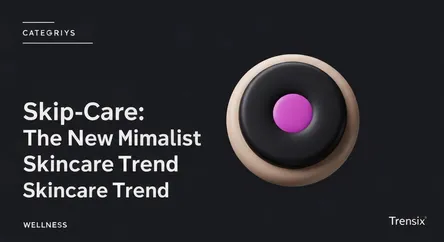Wellness
Skip-Care: The New Minimalist Skincare Trend

A Korean beauty trend that simplifies your routine. Skip-care focuses on using fewer, multi-functional products to save time, money, and your skin.
What is it?
Skip-care is a popular skincare trend originating from Korea that champions a "less is more" philosophy. It's a direct response to the famously complex 10 or 12-step Korean beauty routines. The core idea is to streamline your daily regimen by "skipping" unnecessary products and instead using a few, targeted items that serve multiple purposes. Often called a "cosmetics diet," this approach encourages you to identify the essential ingredients your specific skin type needs and eliminate superfluous steps, without sacrificing results. The goal is to achieve healthy skin with a minimal, yet effective, routine.
Why is it trending?
The skip-care trend is gaining traction as people feel overwhelmed by elaborate skincare rituals. It appeals to those seeking efficiency and a more sustainable beauty routine, saving both time and money. This minimalist approach is also driven by a growing consumer desire for value and proven efficacy, especially in the face of rising inflation. The movement gained further momentum during the COVID-19 pandemic as lifestyles shifted and people spent less time on extensive beauty regimens. It represents a broader shift towards "skinimalism"—a focus on natural skin and using only essential, hard-working products.
How does it affect people?
Adopting a skip-care routine helps individuals save money and declutter their cabinets. By using fewer products, there's a reduced risk of skin irritation and sensitivity that can come from layering multiple, potentially incompatible ingredients. This trend empowers consumers to become more educated about their skin's actual needs and the ingredients that work for them. In response, the beauty industry is innovating more multi-functional products, such as hydrating toners that double as creams or cleansers with exfoliating properties. This shifts the focus from the quantity of steps to the quality of the products used.